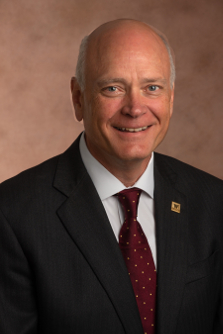
In 2018, the medical school marked several important milestones with the granting of full accreditation and initial accreditation for the institution from the Liaison Committee on Medical Education (LCME) and the Higher Learning Commission (HLC), respectively, as well as provisional certification from the U.S. Department of Education, Joint Accreditation for Interprofessional Continuing Education (IPCE) and accreditation from the Joint Commission and the Society for Simulation in Healthcare.
Now, Dr. Hal B. Jenson, WMed’s founding dean, says an important next step is on the horizon as the medical school’s Human Research Protection Program (HRPP) will seek accreditation from the Association for the Accreditation of Human Research Protection Programs, Inc. (AAHRPP).
“The rationale for seeking accreditation from the AAHRPP is to ensure that our polices and practices are of the highest standards and that the work we do ensures the safety, well-being, and rights of individuals who are participating in clinical research,” Dr. Jenson said. “The goal isn’t to check a box for accreditation. The goal is to do things the right way. We’ve done a good job setting things up the right way in all aspects of the medical school, as evidenced by the many types of accreditation and recognition that the medical school has received.”
The AAHRPP is an independent, non-profit accrediting body that uses a voluntary, peer-driven, educational model to ensure that human research protection programs meet rigorous standards for quality and protection. To earn accreditation, the HRPP at WMed will participate in a multi-step process and provide tangible evidence — through policies, procedures, and practices — of its commitment to scientifically and ethically sound research and to continuous improvement.
Dr. Jenson said the pursuit of AAHRPP accreditation has been a multi-year process that involved several key steps, including the continued development of policies and procedures to support accreditation, the recruitment of HRPP Director Maureen Owens, MM, CIP, and the recent launch of iMedRIS, a new electronic application system that offers a streamlined process for faculty, residents, students, staff and community faculty to submit human subjects research studies for approval to the WMed Institutional Review Board (IRB).
Accreditation from the AAHRPP is a “seal of approval” that will open the door to researchers at the medical school being able to work closely with pharmaceutical and medical device companies, and other industry professionals on important clinical trials.
“The development of most new drugs and therapies come out of private industry research,” Dr. Jenson said. “If we want to advance knowledge and the availability of new medicines, new therapies and new devices for our patients and the region, that is best achieved by working with industry.”
“As a physician, I have participated in clinical trials for drugs and vaccines that I know have saved lives because there wasn’t another therapy available other than participating in a clinical trial,” Dr. Jenson added. “The clinical trials that are ongoing, and the expansion of clinical trials that are conducted here, will make cutting-edge therapies available to our patients. Otherwise our patients would have to wait until the studies are completed and the medications have been approved for distribution.”
Dr. Jenson said AAHRPP accreditation will serve as an assurance to the community, and the industry professionals that we collaborate with, that the human subjects research being conducted at the medical school is scientifically and ethically sound.
The accreditation process includes several steps, including preparation of an application that involves a self-assessment and the submission of organizational documents. The process also includes an on-site visit and an application review by the AAHRPP’s Council on Accreditation.
